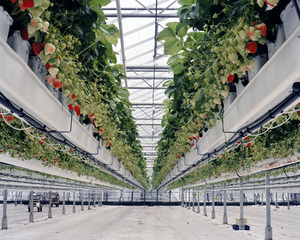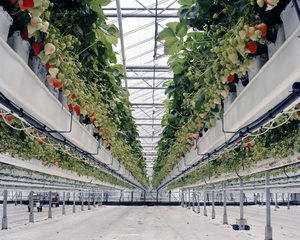Of Tomato Ebola.
In 1961, Nigeria was a powerhouse in groundnut exports, we controlled 42% of the global market? By 1980 we had a 0% i.e. (ZERO) market share of the shelled groundnut market…. what happened?
Aflatoxin…..
What?
Aflatoxin is a poison produced by a fungus called Aspergillus flavus. Aflatoxin contaminated the groundnut produced in Nigeria It is very dangerous to humans and animals causes liver cancer, suppresses the immune system, and retards the growth and development of children.
So the story is simple, the Aflatoxin hit Nigeria, our exports markets advised new strict sanitary requirements to accept our groundnut exports, we could not meet them. we lost our export markets, the groundnut pyramids vanished. We never recovered. So It’s not oil per say that killed the groundnut pyramids, but our inability as a nation to respond to a fungus.
Lets look at Malawi, The 1980s their groundnut export sector collapsed as well due to the same aflatoxin. :” Their share of groundnut exports of total production declined from 64 percent, early in the 1980s, to only 0.2 percent later that same decade” (Babu et al, 1994)….But today More than 4,000 farmers are again exporting high-quality groundnuts to Europe under a fair trade agreement.
How?
A new low-cost toxin detection kit by the International Agriculture and Research center for Semi Arid Tropics (ICRISAT) has revitalized their export business. The toxin detection kit has cut the cost of testing crops to US$1 per sample, and has re-opened the doors to export.
$1
Malawi had nowhere else to go. To Malawi going from 64% to 0% was unacceptable, to Nigeria, going from 42% of to 0% was ok… (the FGN had crude oil to make up.) So Malawi responded to a fungus, Nigeria could or did not…. (are you not ashamed yet?).
So what happened when crude oil no longer funds the Federal budget and a cash crop fails? Well we will soon know that answer.
Nigeria is the 14th largest producer of tomatoes in the world, and is the largest producer of tomatoes in sub-Saharan Africa. Yet today tomatoes are under attack in Nigeria by a moth called the Tuta Absoluta. The Moths are swam killers who can wreck a harvest in 48 hours, some call them the “Tomato Ebola”. Areas in Kaduna, Jigawa, Plateau Kano and Katsina have been severely affected.
These things are bad ladies and gentlemen, these moths attacked Sudan in 2010, it took them three years to recover, the damm buggers can’t be killed by spraying, the Kaduna State Commissioner for Agriculture, Dr. Manzo Maigari said. “The problem with the disease, is that no amount of spraying will kill the larva of the moth. You spray it, after about three hours, it comes back to life.
The effects of these moths are huge The Governor of Kaduna State, Mallam Nasir el-Rufai said. “In the past one month, 12 LGAs of the state that produce tomato have lost 80 per cent of its harvest. In three LGAs, about 200 farmers have lost N1bn worth of their tomato.
N1b…lost by poor farmers, who will now have no income……..
So with all these issues, loss of livelihood, loss of crops, shut down of factories has anyone read or seen a statement by the Federal Ministry of Agriculture on this Tuta Absoluta?
Anyone?
Are we not repeating the errors of the groundnuts and Aflatoxin again?
The problem this time is there is no oil money to use to replace tomatoes, in fact The Director General of the Raw Material and Research and Development Council (RMRDC), Dr. Hussaini Ibrahim, said Nigeria spends about $1.5 billion annually on tomato product-importation. With the wipeout of our 2016 tomato harvest, we will import tomatoes for the rest of 2016, and possibly 2017, paid with foreign exchange we don’t have.
We are in a bind on this one…the cause is natural, but the response to this has been below par…. just like the Aflatoxin response. I am worried because we have not learned our lesson…since January 2013 Nigeria dried beans have been banned by the European Union. Why? Same issues of food safety
Tomatoes have gone from N800 to N20,000 yet no statement? No analysis? No public information on how farmers can kill this pest? Nothing…
Clearly we will see our non-oil exports fall, which is sad because we really need every non-oil dollar we can earn…this is why the lack of a clear and visible action by the Ministry of Agriculture is troubling. Are they only focused on grass from Brazil?
We can do better, I see pictures of tomatoes growing without soil, just in nutrient rich water, with pink UV light (too much sun stunts tomatoes, UV are controlled to deliver right dosage) in high rise building in China, In Japan they have 25,000 square feet, indoor farms that can yield up to 10,000 heads of lettuce a day. That’s 100 times more per square foot than traditional methods, and uses 99 percent less water usage than outdoor fields. The light, air and temperature is regulated, no Tuta Absoluta can get inside the building.
Nigeria is paying to put satellites into space, why cant we pay to put indoor farms in all Senatorial Zones in Nigeria? Why cant we digitize our farming? I doubt there are farms in Nigeria that can compete yield wise with that indoor farm in Japan. Think about it, we can have indoor farms in Marina Lagos, growing tomatoes, pepper Lettuce, all year round, no transportation costs…why are we not doing stuff like this?
If food costs drop, inflation rate drops, and every family can get food to eat, surly that is a good thing, that everyone agrees with…
So why are we not doing it?
Sign!
It’s our problem, we can fix it
(Photo Credit: Freya Najada)

